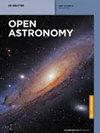韩国历史上记录的彗星C/1652 Y1观测数据
IF 0.5
4区 物理与天体物理
Q4 ASTRONOMY & ASTROPHYSICS
引用次数: 0
摘要
我们报告了韩国关于 C/1652 Y1 彗星的记录,这些记录在以往的历史彗星研究中从未出现过。根据韩国的历史文献,这颗彗星被描述为 "白星 "或 "客星",在1652年12月19日至1653年1月9日期间被肉眼观测了22天。在这项研究中,我们首先核对了韩国文献中关于 C/1652 Y1 彗星的记录,并将译文放在附录中,以供今后参考。然后,我们将韩国的观测结果与使用马斯登(Marsden)(1983 年。我们还比较了 Weigelius 和 Schiltero(1653.Commentatio astronomica de cometa novo qui sub finem anni 1652 lumine sub obscuro nobis illuxit.Jenae:Typis Georgii Sengenvvaldi)和海维留斯(1668.Cometographia, Totam Naturam Cometarum; Exhibens.Gedani: Typis Auctoris, & Sumptibus, Simon Reiniger)。参阅)Marsden(1983 年.彗星轨道目录.Hillside:Enslow 出版社).轨道.Hillside:Enslow Publishers)。我们发现,韩国的观测结果与马斯登计算出的轨道路径以及魏格柳斯和希尔特罗的图示存在差异,尤其是在观测期接近尾声时。总之,我们相信这项研究将有助于改进 C/1652 Y1 彗星的轨道路径计算。本文章由计算机程序翻译,如有差异,请以英文原文为准。
Observations of comet C/1652 Y1 recorded in Korean histories
We report the Korean records for comet C/1652 Y1, which have not been introduced in previous studies on historical comets. According to Korean historical documents, this comet, described as bai xing (white star, in literal) or ke xing (guest star, in literal), was observed with the naked eye for 22 days from December 19, 1652 to January 9, 1653. In this study, we first cross-checked the records of comet C/1652 Y1 among Korean documents and presented the translations in the Appendix for future reference. We then compared the Korean observations with the orbital path determined from calculations using the orbital elements provided by Marsden (1983. Catalog of cometary orbit. Hillside: Enslow Publishers). We also compared the illustrations depicted by Weigelius and Schiltero (1653. Commentatio astronomica de cometa novo qui sub finem anni 1652 lumine sub obscuro nobis illuxit. Jenae: Typis Georgii Sengenvvaldi) and by Hevelius (1668. Cometographia, Totam Naturam Cometarum; Exhibens. Gedani: Typis Auctoris, & Sumptibus, Simon Reiniger). Cf) Marsden (1983. Catalog of cometary orbit. Hillside: Enslow Publishers). orbit. Hillside: Enslow Publishers). We found that the Korean observations show discrepancies with the orbital path calculated by Marsden and the illustration of Weigelius and Schiltero, particularly near the end of the observation period. In conclusion, we believe that this study will contribute to improving the orbital path calculation of comet C/1652 Y1.
求助全文
通过发布文献求助,成功后即可免费获取论文全文。
去求助
来源期刊

Open Astronomy
Physics and Astronomy-Astronomy and Astrophysics
CiteScore
1.30
自引率
14.30%
发文量
37
审稿时长
16 weeks
期刊介绍:
The journal disseminates research in both observational and theoretical astronomy, astrophysics, solar physics, cosmology, galactic and extragalactic astronomy, high energy particles physics, planetary science, space science and astronomy-related astrobiology, presenting as well the surveys dedicated to astronomical history and education.
 求助内容:
求助内容: 应助结果提醒方式:
应助结果提醒方式:


